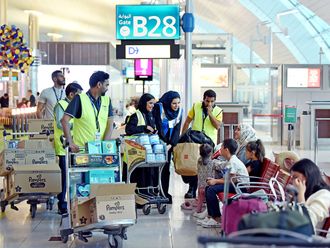Dubai: Bahraini carrier Gulf Air is expecting a “tougher year” in 2016 with Middle East instability showing no signs of abating and a low oil price making regional governments rethink their budgets. Still, the airline is keeping in its plan to break even this year.
Gulf Air, once the Middle East’s top carrier, has cut jobs and axed unfeasible routes in its effort to turn a profit. In 2014 it trimmed its losses by 32 per cent to 67.7 million Bahraini dinars in 2014.
The airline’s financial year ends in March and Acting Chief Executive Maher Salman Al Musallam told Gulf News on Wednesday he has cut losses “by a good margin” in 2015 compared to the previous year.
But while many around the world brace as China, the world’s second-biggest economy, slows down, Gulf Air is concerned about the instability in its backyard in countries like Syria, Iraq and Lebanon.
“We are living here in the Gulf where the geopolitics is affecting us more than anything else because we are surround by crises … you never know when things might get out of hand,” Al Musallam said by phone.
The low oil price is also a concern, even though it has helped Gulf Air substantially cut its operating costs. “We are very much affected by the oil [price] and the projects that might be suspended or put on hold here in the Gulf than anything in China,” Al Musallam said.
But with the oil price staying low at least for now, Gulf Air plans to hedge some of its fuel requirements by June 2016. Fuel is often an airline’s single largest operating cost.
“This is a long process, we don’t want to get it wrong,” Al Musallam said.
New ownership structure
Al Musallam believes a new ownership structure with a holding company owning Gulf Air, Bahrain International Airport and the services companies at the airport including duty free, will lead to the long-term profitability of the airline. He said he is hopefully this will happen in 2016.
Iran
This month, Gulf Air cut 16 weekly flights to Iran in line with the Bahraini government’s decision to follow Saudi Arabia in cutting diplomatic relations with Tehran. Al Musallam said that while Iran is an “important market,” dropping the flights is “not a big deal.”
“We could go without Iran for a while. [But] hoping that whatever circumstances that led to the closure is going to, we could go back again,” he said.
Gulf Air will announce an order for 40 new Airbus and Boeing aircraft, including restructuring a 2008 order for 24 Boeing 787-8s to the larger 787-9 variants, in the latest step in its restructuring. The airline plans to increasingly focus on point-to-point flights to cities in the Middle East, Gulf and Indian Subcontinent as it moves to offer an alternative to the large intercontintenal carriers in the region.
“We need to operate locally, we need to go into point to point, we need to emphasise on our frequencies,’ Al Musallam said.












